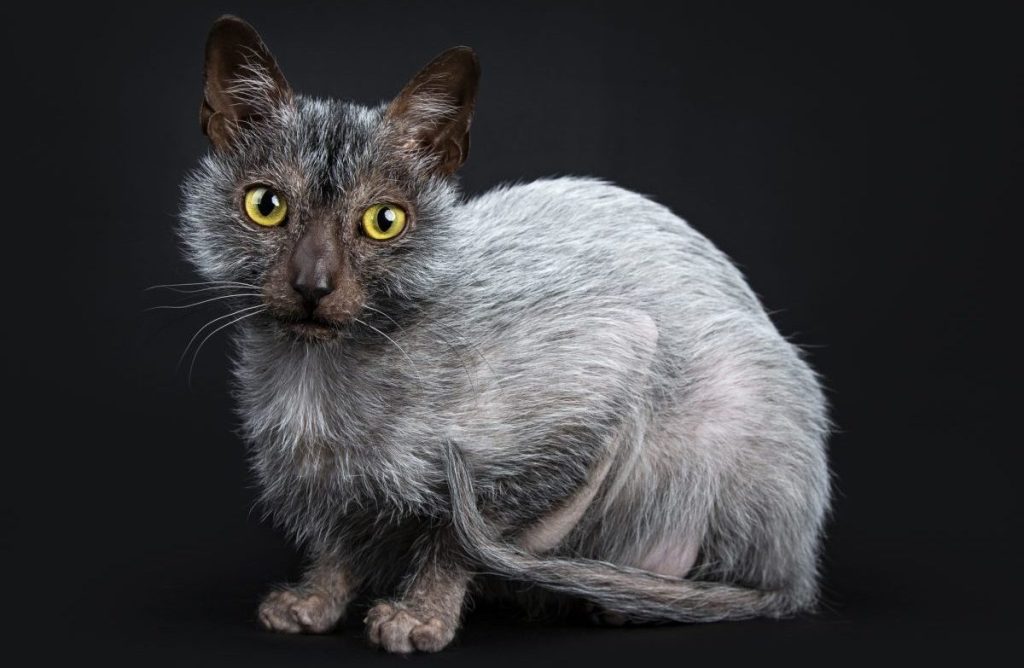The Lykoi cat, often known as the “werewolf cat,” is a breed recognized for their one-of-a-kind looks. These cats sport a partially or fully hairless coat with a roan pattern, providing them with an iconic apperance. The Lykoi’s hair coat is not only sparse, but also exhibits variations in color, ranging from solid hues to tabby patterns. Despite their eerie appearance, Lykoi cats are friendly, intelligent, and social. They often form strong bonds with their human companions and get along well with other pets.
Lykoi cats are also known for their playful nature and can be quite active. As a relatively new breed, Lykoi cats are still gaining recognition and popularity in the cat world, with breeders working to establish and refine the standard for this captivating and enigmatic feline variety. Since their emergence in 2011, the Lykoi have quickly picked up a bit of feline fame.
When considering a Lykoi, it’s advisable to prioritize adopting from rescue organizations or shelters to provide a loving home to a cat in need. However, if you decide to purchase, it’s crucial to choose a reputable breeder. Conduct thorough research to ensure that the breeder follows ethical practices and prioritizes the well-being of their cats. Reputable Lykoi breeders prioritize the health and temperament of their cats, conduct necessary health screenings, and provide a nurturing environment for the kitties. This active approach ensures that you bring home a healthy and happy kitty while discouraging unethical breeding practices.
Quick Facts
- Origin: United States
- Size: Medium
- Breed group: Natural
- Lifespan: 10-15 years
- Coat: Short, roan (mix of black and white hairs), with distinctive markings on the face, ears, and tail.
- Temperament: Intelligent, playful, affectionate, and curious
- Exercise needs: Moderate
- Training: Trainable
- Grooming: Low-maintenance
- Lykoi cats can change color! Well, sort of. After they molt their fur, it sometimes grows back a different shade. The skin color can also change, turning black over time.
- This cat is very rare, with less than 100 standard show cats in existence.
Lykoi Cat Pictures
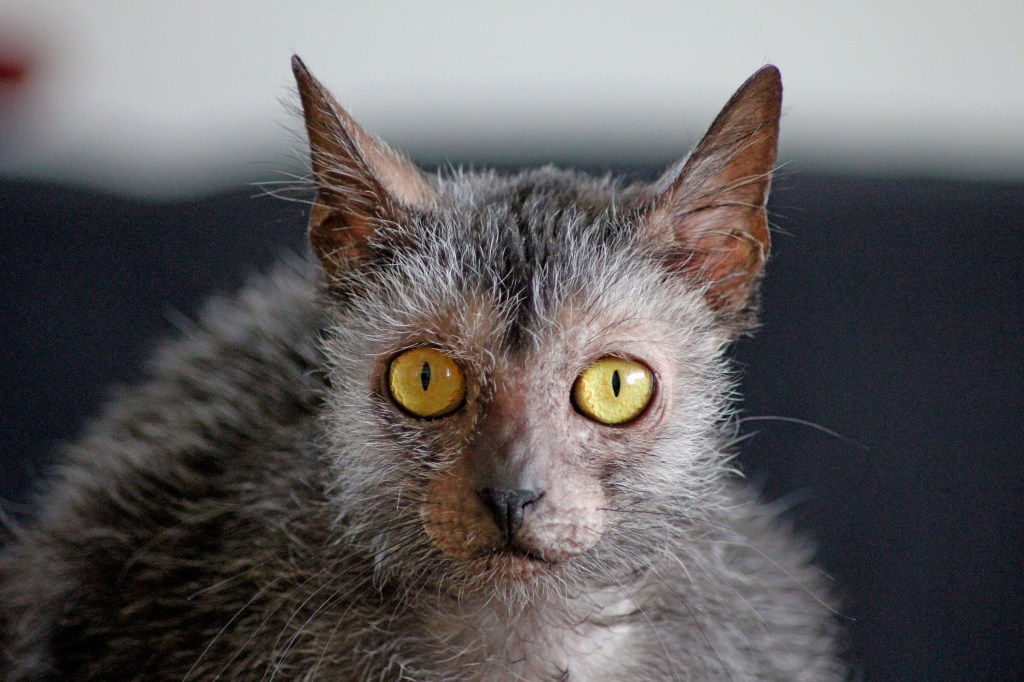
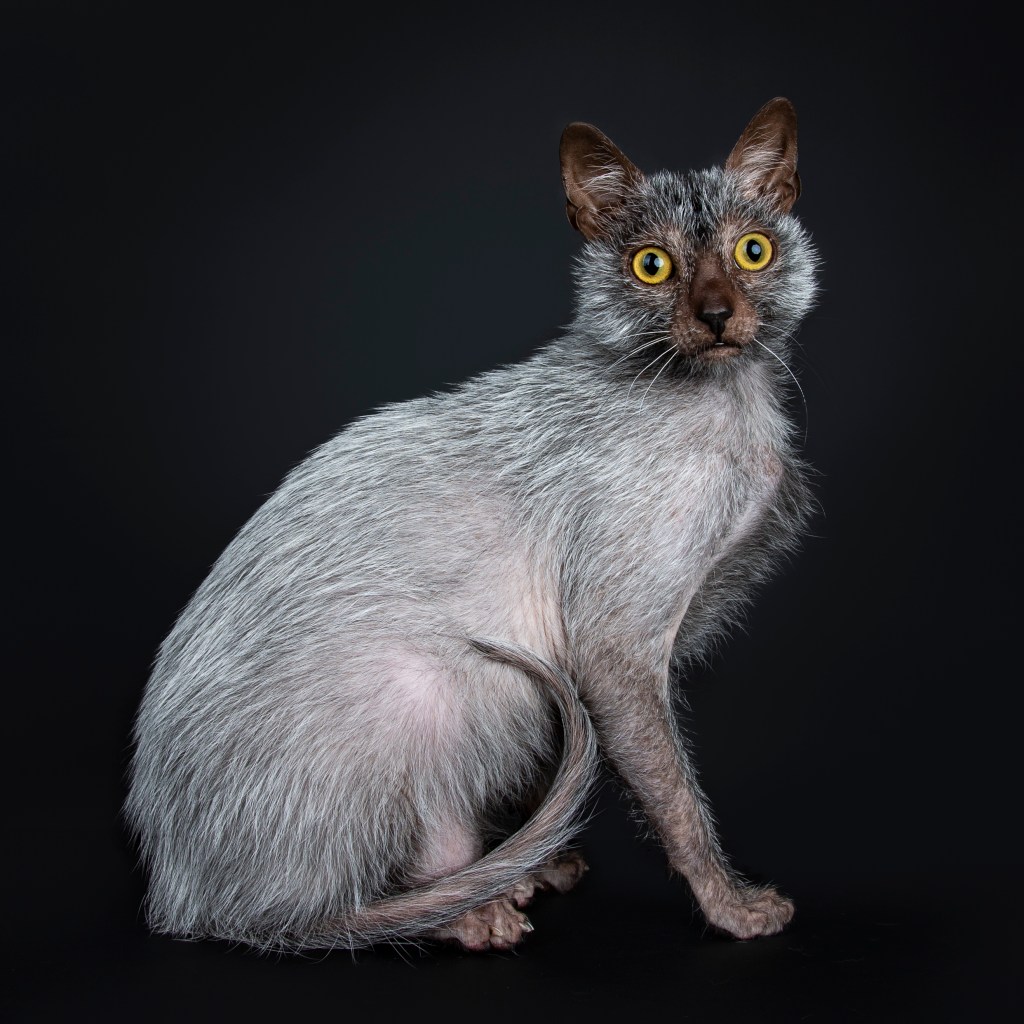
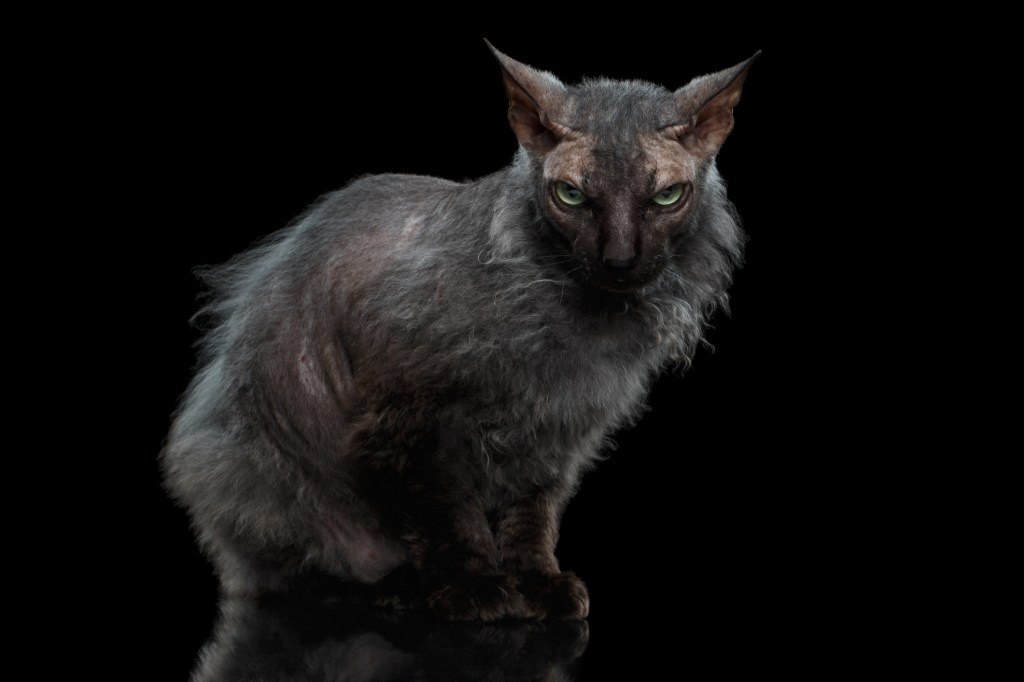
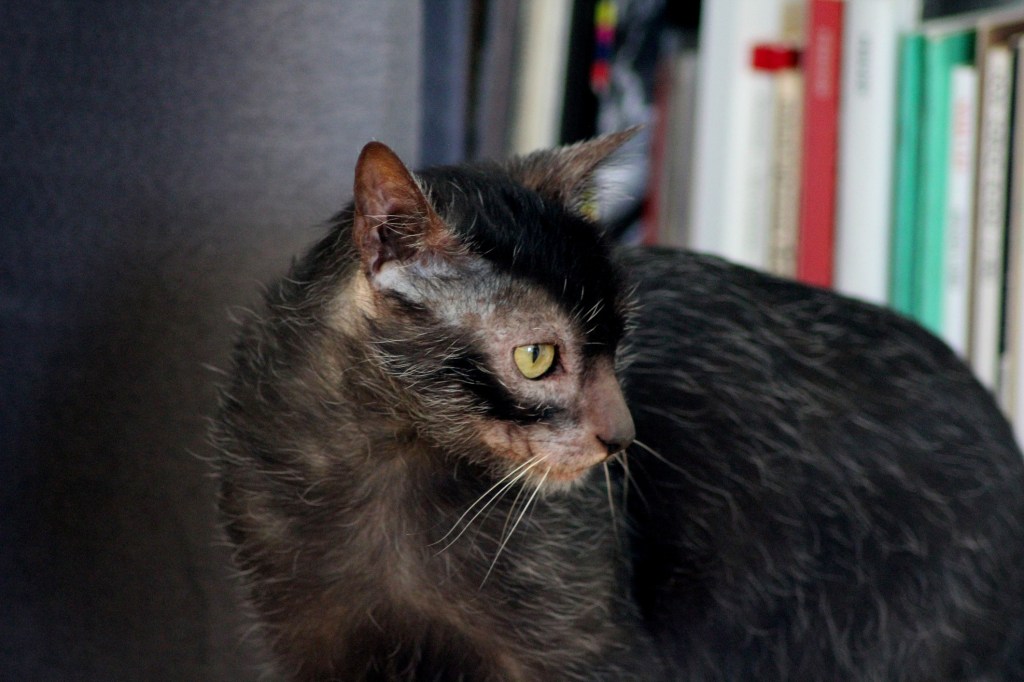
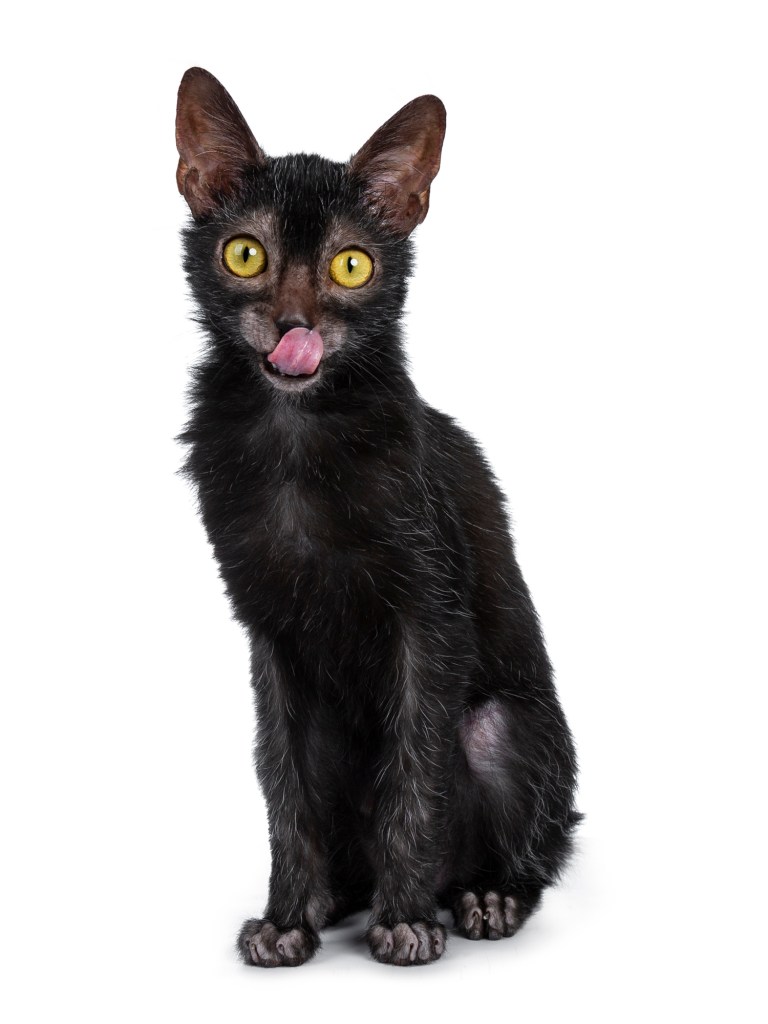
-
Affectionate with Family
Some cat breeds are typically independent and aloof, even if they’ve been raised by the same person since kittenhood; others bond closely to one person and are indifferent to everyone else; and some shower the whole family with affection. Breed isn’t the only factor that goes into affection levels; cats who were raised inside a home with people around feel more comfortable with humans and bond more easily.

See Cats Less Affectionate with Family -
Amount of Shedding
If you’re going to share your home with a cat, you’ll need to deal with some level of cat hair on your clothes and in your house. However, shedding does vary among the breeds. If you’re a neatnik, you’ll need to either pick a low-shedding breed or relax your standards. This furniture cover can make it easier to clean up cat hair and keep it off your sofa!
-
General Health
Due to poor breeding practices, some breeds are prone to certain genetic health problems. This doesn’t mean that every cat of that breed will develop those diseases; it just means that they’re at an increased risk. If you’re looking only for purebred cats or kittens, it’s a good idea to find out which genetic illnesses are common to the breed you’re interested in.
-
Potential for Playfulness
Some cats are perpetual kittens—full of energy and mischief—while others are more serious and sedate. Although a playful kitten sounds endearing, consider how many games of chase the mouse-toy you want to play each day, and whether you have kids or other animals who can stand in as playmates. A classic wand cat toy like this one is perfect for playful felines!
-
Tendency to Vocalize
Some breeds sound off more often than others with meows, yowls, and chattering. When choosing a breed, think about how the cat vocalizes and how often. If constant “conversation” drives you crazy, consider a kitty less likely to chat.
-
Kid-Friendly
Being tolerant of children, sturdy enough to handle the heavy-handed pets and hugs they can dish out, and having a nonchalant attitude toward running, screaming youngsters are all traits that make a kid-friendly cat. Our ratings are generalizations, and they’re not a guarantee of how any breed or individual cat will behave; cats from any breed can be good with children based on their past experiences and personality.
-
Friendly Toward Strangers
Stranger-friendly cats will greet guests with a curious glance or a playful approach; others are shy or indifferent, perhaps even hiding under furniture or skedaddling to another room. However, no matter what the breed, a cat who was exposed to lots of different types, ages, sizes, and shapes of people as a kitten will respond better to strangers as an adult.
-
Easy to Groom
Some breeds require very little in the way of grooming; others require regular brushing to stay clean and healthy. Consider whether you have the time and patience for a cat who needs daily brushing. You should definitely pick up this awesome de-shedding tool for cats of any hair length!
-
Intelligence
Some cat breeds are reputed to be smarter than others. But all cats, if deprived the mental stimulation they need, will make their own busy work. Interactive cat toys are a good way to give a cat a brain workout and keep them out of mischief. This scratcher cat toy can keep your smart kitty busy even when you’re not home!
-
Pet Friendly
Friendliness toward other household animals and friendliness toward humans are two completely different things. Some cats are more likely than others to be accepting of other pets in the home.
Lykoi History
The Lykoi cat, often referred to as the “werewolf cat” due to its unique and striking appearance, is a relatively new and rare breed of domestic cat. The Lykoi cat breed began to develop in 2010 when two separate natural mutations occurred in domestic cat populations. These mutations resulted in cats with a distinctive, partially hairless, and eerie appearance. The word “Lykoi” comes from the Greek word for “wolf,” which was chosen because of the breed’s resemblance to a werewolf.
The first natural mutation occurred in Tennessee, USA, where a family of partially hairless cats with a werewolf-like appearance was discovered. The second mutation took place in Virginia, USA, where another family of cats exhibited similar traits. Breeders were fascinated by these unique cats and began working to establish a breed standard.
Breeders who were interested in developing the Lykoi cat breed started a selective breeding program using the cats with these unique mutations. They aimed to maintain the Lykoi’s distinctive appearance while ensuring that the cats were healthy and well-tempered.
The Lykoi cat was officially recognized as a breed by The International Cat Association (TICA) in 2012. This recognition marked a significant milestone in the breed’s development, granting it a degree of legitimacy within the cat fancy community.
Lykoi cats are known for their partially hairless appearance, with a patchy coat that can range from nearly bald to a sparse coat of hair that resembles a werewolf. They have striking golden eyes, large ears, and a slender, elegant body. Despite their unusual appearance, Lykoi cats are typically known for their friendly and affectionate nature.
The Lykoi cat remains a relatively rare breed due to its unique appearance and the challenges involved in maintaining the breed’s characteristics through selective breeding. However, the breed has garnered a following of enthusiasts who appreciate their distinctive appearance and friendly personalities.
Lykoi Size
The Lykoi is a small- to medium-sized cat. As is always the case, exact size standards might vary.
Most Lykoi cats weigh in at four to seven pounds. That said, many may be smaller or larger than average.
Lykoi Personality
When you find yourself living with a Lykoi, you’ll immediately notice just how smart these cats are. As a breed, they’re inquisitive, curious and great problem solvers–so you’ll want to ensure that you have a stash of interactive cat toys available, plus a batch of play items that are rotated regularly. Keeping your Lykoi mentally stimulated will help bring out the best in this breed’s personality.
Along with being a super smart kitty–and a feline that you can teach to play games of fetch–the Lykoi is generally an all around energetic cat who loves to stay active. Make sure you have adequate space and scope for climbing missions if you’re considering adopting a Lykoi.
Fortunately, at the end of a hard day’s playing, the Lykoi loves nothing more than to cuddle up with the humans in their life and enjoy some well deserved relaxation time.
Lykoi Health
Lykois are generally considered to be healthy cats, but it’s important to schedule regular wellness visits with your cat’s vet. There aren’t any breed specific health problems associated with the Lykoi, but always keep an eye out for signs that your cat might be in distress or pain. It’s also worth nothing that, due to the breed’s short history, accurate predictions as to their average lifespan are not yet available.
- Skin and Coat Issues: Due to their partially hairless appearance, Lykoi cats may be more susceptible to skin problems. This can include skin infections, rashes, and sunburn. It’s important to provide them with proper sun protection and regular skin care.
Lykoi Care
As with all cats, it’s important to keep up your Lykoi’s regular veterinary checkups to detect any health concerns early. Your vet can help you develop a care routine that will keep your cat healthy. Beyond scheduling yearly wellness visits with your vet, make sure that you pick up a scratching post for your Lykoi’s living environment. This can help promote healthy scratching and keep the cat’s nails in good condition. The Lykoi is such an energetic kitty that it’s exceptionally important that their nails are kept in great shape.
The breed’s ears should also be examined regularly for signs of dirt building up or possible infection. Talk to your vet about starting a regular teeth brushing regimen that will suit your Lykoi. Your vet can advise you about specific brands and techniques. Finally, because the Lykoi is a cat with such high energy levels, it’s imperative that you add a cat tree to your home.
Lykoi Coat Color And Grooming
You’ll usually see the Lykoi sporting a signature black or gray coat. Sometimes a silvery shade of white also appears. The breed’s roan coat gives it an endearingly patchy appearance. When it comes to grooming, most Lykoi cats are fine with weekly brushing sessions–but make sure that you brush in a gentle fashion so that you don’t irritate or hurt the cat’s skin. Ask your vet for help on techniques if needed.
Also, due to the cat’s lack of hair, you’ll need to give your Lykoi regular baths to help keep oils in check. In terms of climate, most Lykoi cats are adaptable, although they generally favor warmer temperatures. You should also always make sure that there’s enough shade and fresh water available during the hotter months.
Children And Other Pets
The Lykoi cat and young kids are a top notch combination. Your kids will love interacting and forming bonds with a cat that resembles a werewolf! Just make sure that early socialization takes place and boundaries are properly set on both sides–and supervise early interactions between kids and cats.
When it comes to other household pets, the good-natured Lykoi fares well with many domestic animals. But always supervise early interactions between the new cat and existing pets. Sometimes these relationships are very much dependent on the individual pets’ personalities. Ultimately, early socialization really pays off with this breed. Make sure to reward your Lykoi for good behavior when you bring them home to your family!
Lykoi Rescue Groups
It may be hard to find a breed specific rescue for Lykoi cats because they are a fairly new and rare breed. However, you may want to try shelters and rescues that cater to all types of cats, including Lykois, as well as your local shelter. Here are some nonprofit rescues you can try:
